Respondents in 24 countries were asked about different forms of governance, including representative democracy, direct democracy, autocracy, technocracy and military rule.
- Majorities in every country polled say that a system in which democratically elected representatives decide what becomes law would be a good way to run their country.
- Direct democracy also receives widespread support.
- Expert rule is popular in many countries, and support has increased since the question was last asked in 2017.
- Systems led by a strong leader or the military are less popular options, although significant minorities – and in some cases, majorities – endorse these approaches.
Views on representative democracy
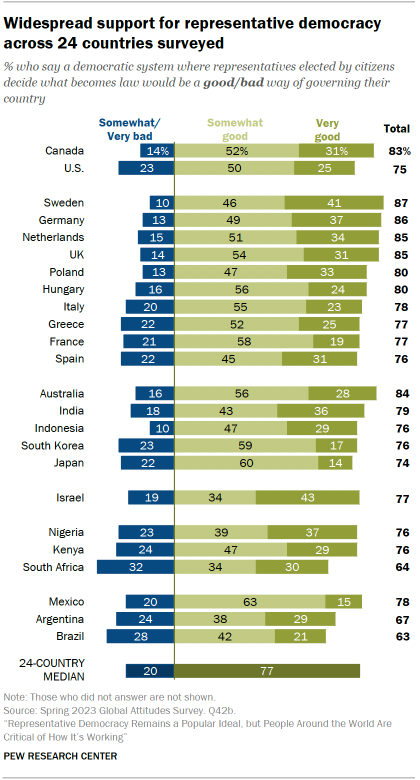
Elements of representative democracy are present in each of the countries surveyed. And although many express dissatisfaction with the way democracy is working in their country, majorities in all of these countries believe representative democracy to be a somewhat or very good form of governance.
Across the 24 nations polled, a median of 77% express support for representative democracy.
Despite frustration with the functioning of democracy, a median of only 20% believe that rule by elected representatives is a bad way to govern.
Changes in views over time
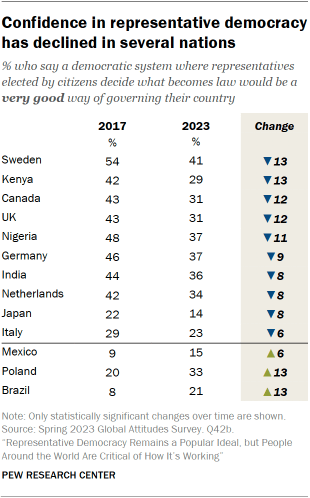
The overall share of the public saying that democracy is a good system has held steady in most countries since 2017.
However, the share of respondents who say representative democracy is a very good way to govern has declined significantly in 10 of 22 countries where trends are available.
Factors related to views on representative democracy
Views of democracy, elected officials and parties: In most countries, those who report satisfaction with the functioning of democracy are more likely to say that representative democracy is a good system.
In 19 countries, this type of government is especially popular among respondents who think their views are represented by at least one party. And in half the countries surveyed, support for representative democracy is higher among those who believe elected representatives care about their opinions.
Economic situation: Opinions about the state of the economy are also related to views about representative democracy. Those who say their country’s economic situation is good are more likely to support representative democracy in about half of the countries surveyed.
Income: In nine countries, people with higher incomes are more likely to say that this is a good way to govern than people with lower incomes.
Education: Those who have more education have more favorable views of representative democracy than those with less education in 11 countries.
Views on direct democracy
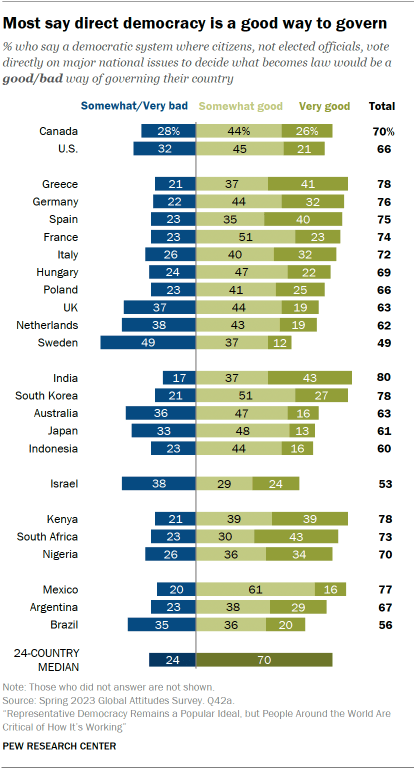
We also asked respondents about direct democracy, described as a system where citizens, rather than their elected representatives, vote directly on major national issues.
Of the five systems respondents were asked about, direct democracy is the second-most popular. A median of 70% say it would be a good way to run their country, and around half or more say this in every country surveyed.
Support for rule by direct vote is lowest in Sweden, where opinion is split: 49% say it is a good way to govern and 49% say it is bad.
Changes in views over time
Support for direct democracy has seen little change since 2017. Notably, however, it is up by 7 percentage points in the UK.
The last time British respondents were asked about direct democracy was less than a year after the Brexit referendum, when 52% of the votes were cast in favor of the UK withdrawing from membership in the European Union. Brexit took effect in January 2020.
Connections between views of elected officials and direct democracy
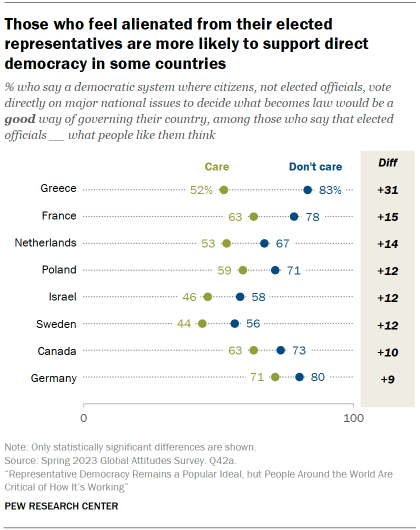
Respondents’ attitudes toward politicians in their own countries inform their view of rule by direct vote.
In a third of countries surveyed, respondents are more likely to favor direct democracy if they say that elected officials do not care what people like them think.
Views on expert rule
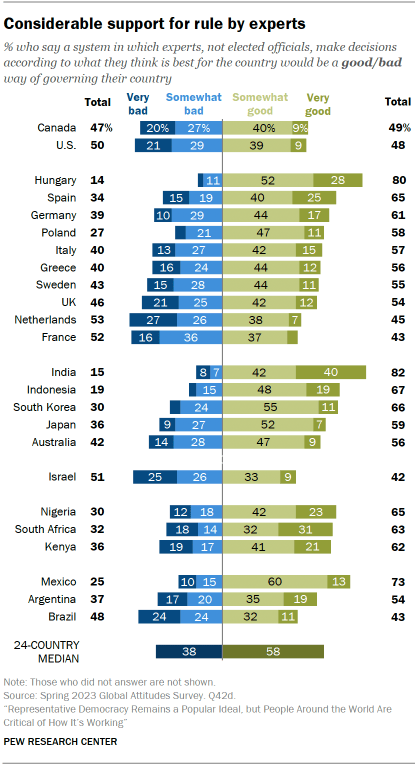
In addition to the two forms of democracy, respondents were asked about their attitudes toward technocracy. This system of government relies on experts, rather than elected officials, to make decisions according to what they think is best for the country.
Majorities in two-thirds of the countries surveyed say this would be a good way to govern. And in Hungary and India, roughly eight-in-ten favor it.
Favorable views are least common in Brazil, France and Israel. Still, about four-in-ten in each of these nations would trust experts to run the country.
Changes in views over time
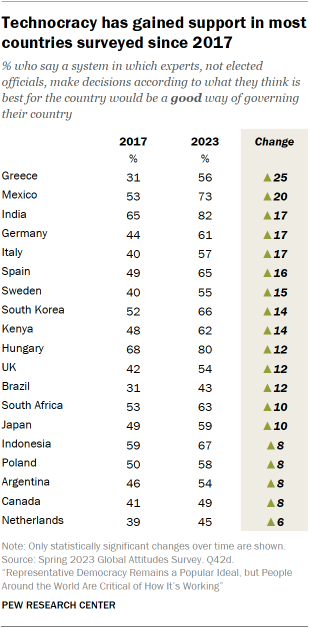
Since 2017, the number of technocracy supporters has gone up in most of the countries surveyed.
This shift could be tied, at least in part, to the COVID-19 pandemic. Since 2020, many have turned to scientists and medical professionals for their expertise on how to manage the crisis.
Analysis in the U.S. shows that support for expert rule is related to perceptions of experts during the pandemic. Among the people who believe public health officials have done a good job of responding to COVID-19, 59% think expert rule is a good governmental system, compared with just 35% among those who say public health officials have done a bad job of dealing with the pandemic.
Views on autocracy
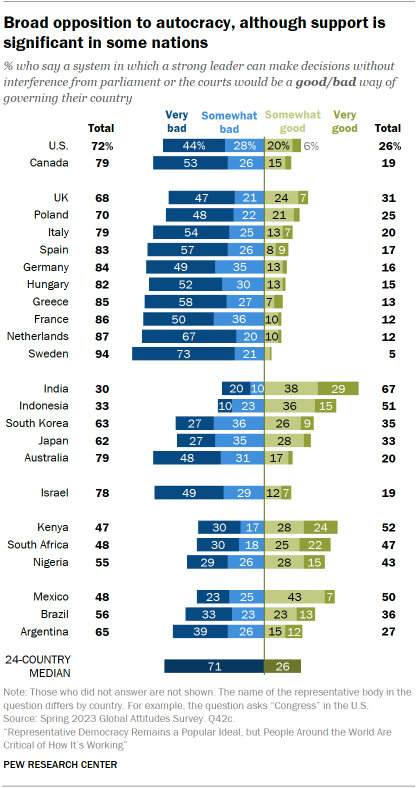
Respondents were asked to consider a system in which a strong leader is free to make decisions without interference from a representative body or independent judiciary.
Autocratic rule is generally unpopular: In all but five of the countries surveyed, majorities reject it. In Canada and most of Europe, half or more say that it is a very bad way to govern.
Still, a median of around a quarter of all respondents are open to it, including large shares of those living in most middle-income countries.
In Mexico and Kenya, views are roughly split between those who say it is a good way to govern and those who say it is bad. Two-thirds of Indians and about half of Indonesians endorse this form of government.
Even in higher-income democracies, substantial minorities describe rule by a strong leader as a good way to govern, including one-in-four or more in Japan, Poland, South Korea, the UK and the U.S.
Overall, a country’s gross domestic product is linked to the share of the public who support autocratic rule. Countries with a higher GDP per capita tend to have fewer people who think rule by a strong leader is a good way to govern.
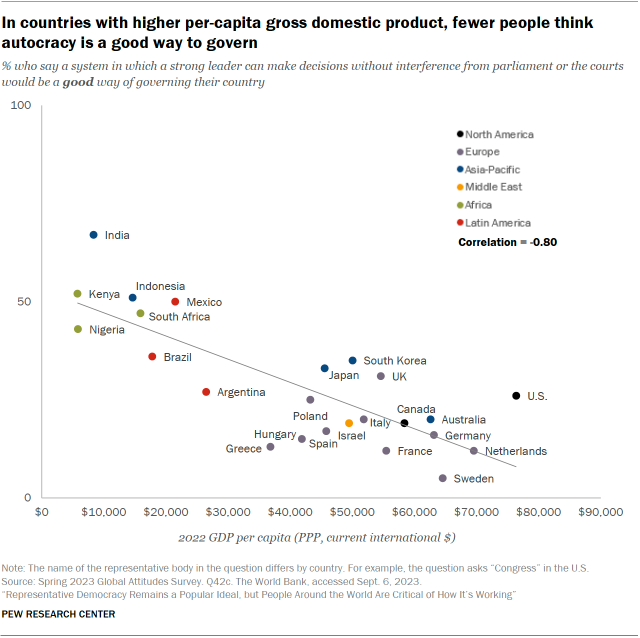
The U.S. stands out to some extent from this pattern: It has the highest per-capita GDP of the countries surveyed, but about half of the other countries express less support for autocracy than the U.S.
Overall, support for a strong leader model is also lower in countries that receive higher ratings from research organizations that rate the health of democracy, such as the Economist Intelligence Unit, Freedom House, International IDEA and the Varieties of Democracy project.
Changes in views over time
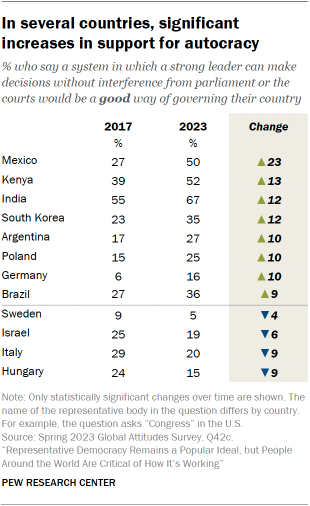
In eight of 22 countries where trends over time are available, the share of respondents who say rule by a strong leader is a good way to govern has gone up. This group of countries is diverse and includes some in Latin America, Africa, Asia and Europe.
Support for a strong leader model is down in four nations: Hungary, Israel, Italy and Sweden.2
Factors related to views of autocracy
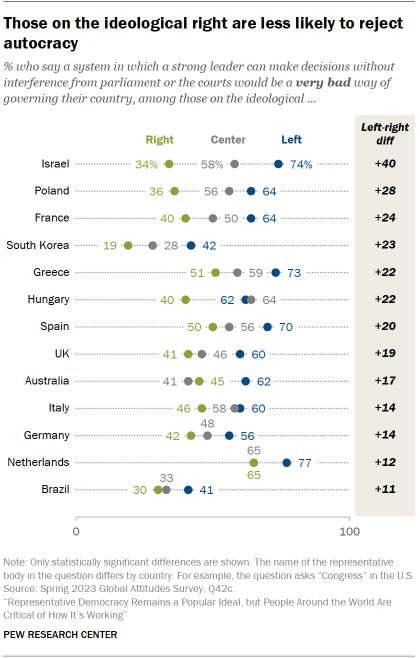
Income: People with lower incomes are more accepting of the idea of a strong leader whose power goes unchecked in 11 countries.
Education: In 15 countries, those with less education are more likely than those with more education to say an autocratic system is a good way of governing.
Ideology: Those on the political right are less likely to say rule by a strong leader is a very bad way to govern in 13 of the 18 countries where ideology is measured – including most of the European countries in our survey and several other advanced economies.
In particular, people who have favorable views of right-wing populist parties in Europe are less likely to characterize autocracy as a very bad system. Often, the difference is considerable: In Germany, 24% of those who favor Alternative for Germany (AfD) say that rule by a strong leader is very bad. The share who strongly reject autocracy is much higher among Germans who view AfD unfavorably (54%). (Refer to Appendix B for more information on how we classify populist parties.)
Views on military rule
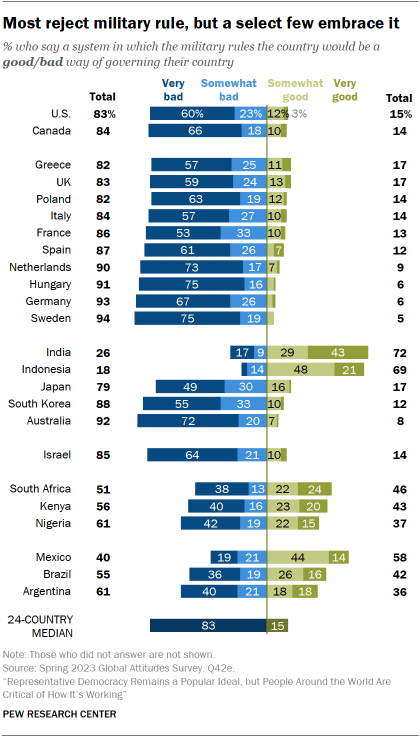
Of the five systems of government that respondents were asked about, military rule is the least popular. A median of only 15% across 24 countries, including some who have previously experienced military rule, think this would be a good way to run their country. In over half of the countries surveyed, majorities believe it would be a very bad way to govern.
In North America, Europe, Australia, Israel and South Korea, military rule is decidedly unpopular: Eight-in-ten or more call it a bad system.
There has been relatively little change on this question since it was last asked in 2017.
Factors related to views on military rule
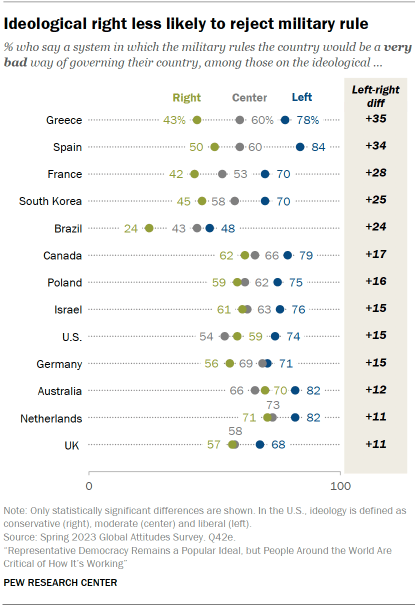
Education: In 16 countries, people who have less education are more accepting of military rule.
Income: In 14 countries, there is more support for military rule among those with lower incomes, compared with those with higher incomes.
Ideology: As with autocracy, those on the ideological right are more open to rule by the military. In 13 countries, right-leaning respondents are less likely to say that military rule is a very bad way to govern than those on the ideological left. Similarly, supporters of right-wing populists are less inclined to believe this type of system is very bad.




